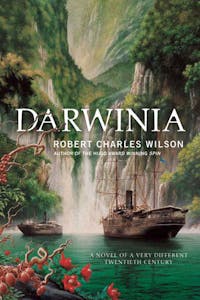Darwinia
A Novel of a Very Different Twentieth Century
 Download image
Download image
ISBN10: 0765319055
ISBN13: 9780765319050
Trade Paperback
320 Pages
$17.99
CA$32.50
In 1912, history was changed by the Miracle, when the old world of Europe was replaced by Darwinia, a strange land of nightmarish jungle and antediluvian monsters. To some, the Miracle was an act of divine retribution; to others, it is an opportunity to carve out a new empire.
Leaving an America now ruled by religious fundamentalists, young Guilford Law travels to Darwinia on a mission of discovery that will take him further than he can possibly imagine—to a shattering revelation about mankind's destiny in the universe.
Reviews
Praise for Darwinia
"A triumph of style over substance . . . [Written in] utterly confident prose, which is clear and level-headed . . . I found myself rooting for the likable Guilford Law, an American who finds himself on the cusp of Armageddon and who sensibly draws back until the last escape route closes. Like Job's, his suffering takes on a cosmic significance [and] his reluctant journey toward the heart of darkness is never boring."—Gerald Jones, The New York Times Book Review
"In the best tradition of Edgar Rice Burroughs, Jules Verne, and H. G. Wells."—The Toronto Globe and Mail
"In 1912, following a cosmic event known as the Miracle, Europe vanishes, replaced by Darwinia, a physiographically similar continent occupied by alien flora and fauna that somehow are biochemically compatible with those of Earth. The US, fueled by an upsurge in religious faith, declares Darwinia open to all colonists. By 1920, a few settlements have been carved out of the new wilderness; a scientific expedition under the American creationist Preston Finch will proceed up the Rhine and across the Alps, its progress recorded by Boston photographer Guilford Law, who leaves wife Caroline and daughter Lily behind in New London. Soon, attacked by bandits, menaced by the strange local wildlife, the expedition's in serious trouble; the survivors report weird dreams. Guilford meets himself as he might have existed: a soldier killed in WWI. Eventually, having discovered a vast abandoned city, Guilford emerges from Darwinia to find that Caroline and Lily, thinking him dead, have run off to Australia. Guilford's doppelganger convinces him that he, and others like him, are troops in some incomprehensible struggle against other demon-ridden humans, such as spiritualist Elias Vale. Billions of years hence, you see, surviving intelligences have built the Archive in order to remember everything that ever happened; but the Archive has been invaded by psions, free-living bits of computer code (the demons that ride Vale and company). Guilford and his associates are avatars of the Archive, awaiting a showdown with the psions."—Kirkus Reviews
"In 1912 the 'Miracle' occurs: Europe vanishes and is replaced by Darwinia, a new universe with unfamiliar flora and fauna. Wilson plays cleverly with alternative history. The U.S., swept up in religious fervor, claims its divine right to conquer wild Europe—the 'Wilson Doctrine.' Remnants of the British Empire reinvent London on the primeval Thames, and challenge American hegemony. Most fascinating, however, are the adventures of an expedition up the Rhine, with its photographer, the soulful, doomed Guilford Law, making 'scientific' entries much like Darwin's on the Beagle. Survivors of the brutal expedition winter in an ancient, alien city, and there discover a race of demons who have been trapped in an incorporeal state by a race of gods. In his terrible dreams, where demons and gods battle for his soul, Law learns that time no longer obeys recognizable rules. Science itself has broken down. Wilson's novel is flawed, perhaps, by its giddy metaphysical interludes, but even so, it is eerie, paranoid, and menacing."—John Mort, Booklist
"The heroes and villains of this surpassingly strange novel are not who they think they are. Though the style is rich, lucid and literate, the point is dizzyingly abstract. Wilson, whose last novel, Mysterium, won the Philip K. Dick Award, uses cosmological physics to envision an intergalactic sentience, millennia old, that fights insect-like 'psions,' machine intelligences, for the survival of consciousness itself. We glimpse this struggle directly only in occasional brief 'Interludes' until well toward the end of the book. Before that, it is the story of Darwinia, a primeval landscape that in 1912 appears on Earth in place of most of Europe, transforming world history. When photographer Guilford Law joins an exploratory expedition, he lands in the middle of nationalistic skirmishes that wipe out most of his party in the bizarre forests of Darwinia, teeming with beasts from alien lines of descent. His personal life, notably his difficult relationship with his young wife, is intimately related, but he eventually learns that he and everything and everyone on Earth are instruments of the cosmic struggle of which Darwinia and the murderous skirmishes are mundane correlatives. Earth is an archive of consciousness that he must help protect. Hideous creatures mass and threaten in an ending reminiscent of Stephen King. Wilson's two-tiered story structure reminds one of Michael Moorcock's work, but it is much more coherent and accessible. In the blurring of character identities, he is comparable to Philip K. Dick or to A.E. Van Vogt. He owes something to Colin Wilson and Lovecraft as well, in the discovery through dreams and archeological wonders of a hidden reality. That he is able to weld the two realities so fluently is remarkable indeed."—Publishers Weekly (starred review)
Reviews from Goodreads
BOOK EXCERPTS
Read an Excerpt
Darwinia
BOOK ONE
SPRING, SUMMER 1920
"Oh ye hypocrites, ye can discern the face of the sky: but can ye not discern the signs of the times?"
--GOSPEL ACCORDING TO ST. MATTHEW
CHAPTER...



